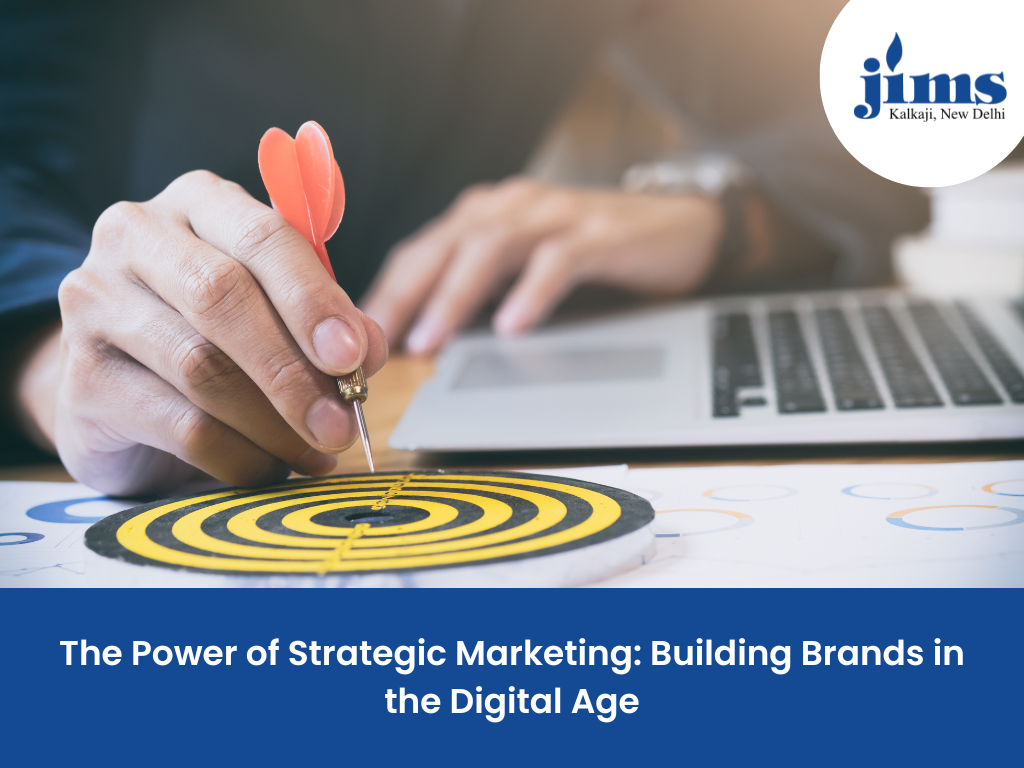Introduction :
In today’s fast-paced digital world, strategic marketing has become the backbone of successful brand building. It encompasses a wide range of activities aimed at creating a strong brand identity, reaching target audiences, and driving business growth. With the ever-increasing competition and evolving consumer behaviours, businesses must harness the power of strategic marketing to stay ahead. In this article we, at We at JIMS, Kalkaji, one of the best business school in Delhi will delve into the significance of strategic marketing in the digital age and explores the key strategies and tactics that can help businesses build powerful brands.
-
Understanding Strategic Marketing in the Digital Age :
The digital age has revolutionized marketing, providing businesses with unprecedented opportunities to connect with consumers. Strategic marketing involves the careful planning, implementation, and evaluation of marketing initiatives to achieve specific objectives. This section provides an overview of strategic marketing, highlighting its core components and explaining how it has evolved in the digital era. It explores the shift from traditional marketing methods to digital marketing, the importance of customer-centricity, and the role of data-driven decision-making.
-
Building a Strong Brand Identity :
A strong brand identity is essential for differentiation and customer loyalty. This section explores the importance of creating a compelling brand identity and the role it plays in shaping consumer perceptions. It discusses strategies for defining brand values, positioning, and messaging, and how businesses can leverage digital platforms to effectively communicate their brand identity. Additionally, it explores the concept of brand consistency across various touchpoints and the impact of visual elements and storytelling in building a memorable brand.
-
Targeting and Segmentation :
In the digital age, understanding the target audience and effectively segmenting them is crucial for successful marketing campaigns. This section delves into the importance of audience targeting and segmentation, exploring how businesses can leverage data and analytics to identify their ideal customers. It discusses the use of market research, customer personas, and psychographic segmentation to tailor marketing messages and offers to specific segments. Additionally, it examines the role of personalized marketing and the benefits of delivering relevant content to different target groups.
-
Content Marketing and Storytelling :
Content marketing has emerged as a powerful tool for building brands in the digital age. This section delves into the concept of content marketing and its role in engaging and nurturing audiences. It explores various content formats such as blogs, videos, social media posts, and podcasts, highlighting the importance of storytelling to create meaningful connections with customers. It discusses the use of storytelling techniques, emotional appeal, and user-generated content to capture attention and build brand affinity. Additionally, it examines content distribution strategies and the importance of measuring content performance to optimize marketing efforts.
-
Embracing Digital Channels and Technologies :
Digital channels and technologies have transformed the marketing landscape, providing businesses with new avenues to reach and engage with their target audiences. This section discusses the importance of embracing digital channels such as social media, search engine optimization, email marketing, influencer partnerships, and mobile advertising. It explores the benefits of leveraging user-generated content, leveraging influencer marketing, and capitalizing on emerging technologies such as artificial intelligence and virtual reality. Additionally, it highlights the significance of optimizing websites for mobile devices and creating seamless omni-channel experiences for customers.
-
Customer Relationship Management and Engagement :
Building strong customer relationships is a key aspect of strategic marketing. This section explores the role of customer relationship management (CRM) systems and customer engagement strategies in nurturing long-term customer loyalty. It discusses the use of personalized communication, loyalty programs, customer feedback, and social listening to create positive customer experiences. Additionally, it examines the importance of leveraging customer data to deliver targeted marketing messages and personalized offers, while maintaining transparency and data privacy.
-
Measuring and Evaluating Marketing Effectiveness :
Measuring the effectiveness of marketing efforts is essential to understand what works and what needs improvement. This section delves into key performance indicators (KPIs) and metrics used to evaluate marketing campaigns. It discusses the importance of data analysis, A/B testing, conversion tracking, and marketing attribution models to optimize marketing strategies and allocate resources effectively. Additionally, it explores the role of marketing analytics tools and dashboards in providing actionable insights and facilitating data-driven decision-making.
Conclusion :
We at JIMS, Kalkaji one of the top management college in Delhi believes that in the digital age, strategic marketing plays a pivotal role in building successful brands. From creating a strong brand identity to leveraging digital channels and technologies, businesses must adapt and embrace the power of strategic marketing to stay competitive. By understanding target audiences, crafting compelling content, nurturing customer relationships, and measuring marketing effectiveness, businesses can thrive in the dynamic and ever-evolving digital landscape. Strategic marketing empowers businesses to connect with consumers, build brand loyalty, and drive sustainable growth in the digital age. With the right strategies and tactics, businesses can navigate the complexities of the digital age and position themselves for long-term success.

